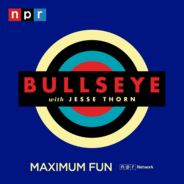We lost an incredibly talented cartoonist last year, Gahan Wilson. For more than 50 years, his twisted single-panel cartoons have appeared in magazines like Playboy and The New Yorker. His work always had this really distinct tone. Wilson's take on the macabre is loopy, dark and strange. There were monsters. Sometimes aliens. Maybe a pirate. To remember his life, his work and his impact we are revisiting Jesse's interview with Gahan from 2010. In it, he talked about the arc of his career and using childhood fears as inspiration. He also talked about his contributions to the National Lampoon.Learn more about sponsor message choices: podcastchoices.com/adchoicesNPR Privacy Policy

Kultur & Gesellschaft
Bullseye with Jesse Thorn Folgen
Bullseye is a celebration of the best of arts and culture in public radio form. Host Jesse Thorn sifts the wheat from the chaff to bring you in-depth interviews with the most revered and revolutionary minds in our culture. Bullseye has been featured in Time, The New York Times, GQ and McSweeney's, which called it "the kind of show people listen to in a more perfect world."
Folgen von Bullseye with Jesse Thorn
1035 Folgen
-
Folge vom 03.01.2020Remembering cartoonist Gahan Wilson
-
Folge vom 31.12.2019Remembering Caroll Spinney, the voice and spirit of Big BirdWe're taking a moment to look back at a past Bullseye guests we lost this year, Caroll Spinney. He was Big Bird's puppeteer for 50 years, but he was so much more than the literal man inside the costume. Caroll was the voice and spirit of the iconic character many of us grew up watching.Learn more about sponsor message choices: podcastchoices.com/adchoicesNPR Privacy Policy
-
Folge vom 24.12.2019End of Year Stand-Up Comedy Special 2019!It's our favorite time of the year: the end of it! We're celebrating 2019 with excerpts from some of the best stand up comedy records of 2019. You'll hear material from Roy Wood Jr, Pete Holmes, Cristela Alonzo, Sara Schaefer, so many more. Enjoy, and Seasons Greetings from all of us at Bullseye!Learn more about sponsor message choices: podcastchoices.com/adchoicesNPR Privacy Policy
-
Folge vom 17.12.2019Holiday Special! Feat. the Monkees' Micky Dolenz, McElroy Brothers and more!Get ready for a bonanza of holiday cheer! This week, we're listening back on the Bullseye holiday special from last year. Micky Dolenz of The Monkees talks about the band's album Christmas Party. The group recorded it with a cavalcade of hit-makers like Rivers Cuomo, Peter Buck of REM and more. And that's not all! We also get some advice from the McElroy Brothers (hosts of My Brother, My Brother and Me and The Adventure Zone) about holiday conundrum. Plus, soul singer Sy Smith — she tells us about the holiday song that changed her life.Learn more about sponsor message choices: podcastchoices.com/adchoicesNPR Privacy Policy
